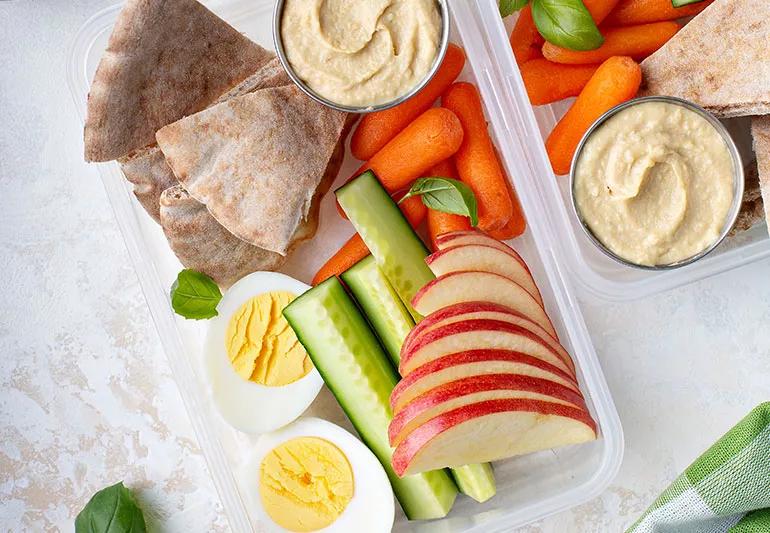Treat yourself to food and drink, but do it smartly

Image content: This image is available to view online.
View image online (https://assets.clevelandclinic.org/transform/b2dad2e6-cfe8-41a7-b2d4-1d727f1af91d/VacationSnacking-1164380765-770x533-1_jpg)
healthy pre-packed snack packs for traveling
Not all vacation souvenirs bring smiles. Want proof? Just step on your bathroom scale after a week or more away.
Advertisement
Cleveland Clinic is a non-profit academic medical center. Advertising on our site helps support our mission. We do not endorse non-Cleveland Clinic products or services. Policy
Travelers typically return from trips heavier than when they left — and research shows those extra pounds tend to hang around longer than your vacation tan, judging by findings at the University of Georgia.
But there are ways to make sure that you don’t lug any unwanted weight home. Let’s unpack some helpful recommendations with dietitian Beth Czerwony, RD.
First, a harsh reality: Calories still count while on vacation. Lounging on a sun-soaked beach doesn’t give you a free pass to consume mass quantities of food and tropical drinks without paying a dietary price.
But this trip is about having fun, right? A vacation, after all, is the dessert of life! “The key is to find a balance,” says Czerwony. “Indulge… but indulge smartly. Have a game plan.”
Consider the following tips when coming up with your strategy:
It’s OK to dig into a few calorie-laden dishes when you’re visiting a new locale. (Think jambalaya in New Orleans or clam chowder in Boston.) But make these meals “special” and adjust your noshing during the rest of the day to compensate.
Don’t just grab a plate and start piling on food. Instead, survey everything that’s available before starting to scoop to avoid impulse eating. “Don’t waste your calories on one thing when you’d rather be eating something else,” Czerwony said.
Advertisement
Don’t forget to put fruits and vegetables on your vacation plate. Look to eat lean proteins, too.
“The same rules apply to eating well,” notes Czerwony. “Those don’t change because you’re in a different location.”
Besides, day after day of gorging on rich and fatty food often brings another result – a rumbly tummy and digestive issues. “You’re going to feel like crud,” says Czerwony, “and that’s no way to spend a vacation.”
Keep some healthier snack options handy for when you’re feeling peckish. Almonds, for instance. Beef jerky, pretzels, protein bars are ideal, too. Basically, anything that is easy to store and eat on the go.
“Sometimes, you’re just hungry and need a bite,” says Czerwony. “Better to have something available than to just grab whatever you see.”
Drinking plenty of water on vacation offers you many benefits – starting with the fact it’s not a sugary soda or alcoholic beverage. That H2O will keep you feeling full, too, which can help slow down your eating.
That idea that it’s always 5 o’clock on vacation? It’s a fun thought, but your body knows different. Stretching a cocktail hour into a cocktail day can multiply your calorie count in ways that require a calculator.
And be mindful of those fruity umbrella drinks, too: “They are delicious, but they have a lot of extra calories,” says Czerwony. “It adds up fast.”
Many trips offer built-in opportunities for exercise. Maybe it’s a hike to explore the woods or a snorkel-wearing visit to an underwater world. Whatever the activity, it’ll burn off some of your vacation-eating calories.
But maybe your plans involve little more than walking out to a chair to read and relax. If that’s the case, it might be good to spend a few minutes on a treadmill or hitting the weights before slipping into chill mode.
“Most places have a gym,” notes Czerwony. “Whether you use it is up to you.”
There are plenty of exercises you can do in your room, too, such as yoga or Tabata.
Breaking out forks and spoons will be part of any trip for a simple reason: You need to eat. But don’t overemphasize every meal, cautions Czerwony. Treat yourself here and there – you are on vacation, after all – but try not to make food the focus.
“Make the experience the special occasion,” she says. “That’s what you’ll remember.”
Advertisement

Sign up for our Health Essentials emails for expert guidance on nutrition, fitness, sleep, skin care and more.
Learn more about our editorial process.
Advertisement
This color additive, found in many pre-packaged foods, may affect people with ADHD or allergies
With a focus on internal cues for hunger and fullness, this eating style may revolutionize your relationship with food
Review the ingredients, watch for sugar and fat, and choose one with the right amount of protein for your needs
Getting the hang of portions can help you better understand how much to put on your plate
A typical recommended balanced diet is half fruits and veggies, a quarter protein and a quarter grains
Foods high in protein, fiber and water can help keep hunger at bay
This quirky food trend is harmless, as long as you’re getting enough protein, fiber and healthy fats
With a little planning, you can fill your belly and boost your energy
Prioritize your health by managing stress, strengthening your social connections and getting quality sleep
Bolsters, blankets, pillows and blocks can offer extra support, stability and comfort
Allergies, postnasal drip, asthma or reflux could be to blame for a cough that won’t quit